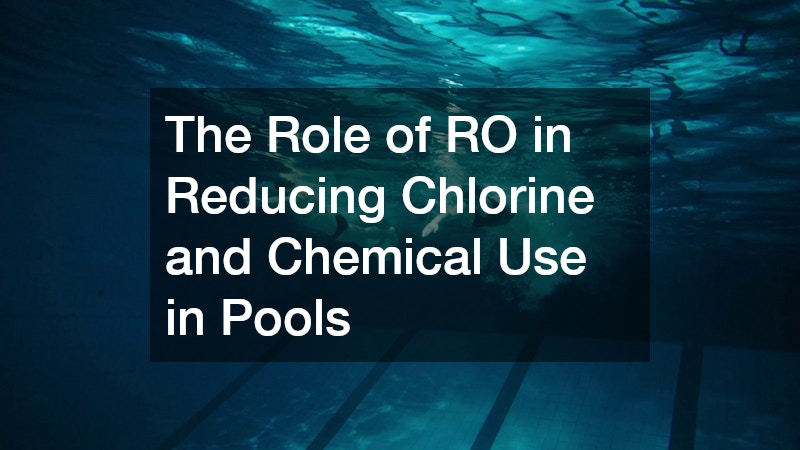Maintaining a sparkling clean and safe swimming pool often requires a delicate balance of chemicals, especially chlorine, to eliminate bacteria, algae, and other contaminants. While chlorine is effective at keeping pools sanitary, excessive chemical use can lead to strong odors, skin and eye irritation, and an increased environmental footprint. This is where reverse osmosis (RO) pool filtration systems come in. Let’s explore the role of a reverse osmosis pool filtration system, explain how it reduces chemical use, and highlight practical benefits for both residential and commercial pool owners.
Understanding Reverse Osmosis in Pool Filtration
Reverse osmosis is a water purification process that removes dissolved solids, minerals, and contaminants from water. In an RO system, water is forced through a semi-permeable membrane under pressure.
This membrane allows water molecules to pass while blocking impurities, including salts, metals, organic compounds, and other particles that traditional pool filters may not fully remove.
For pools, RO systems provide ultra-pure water that serves as a cleaner, more stable baseline. Unlike sand, cartridge, or DE filters, which primarily trap visible debris, RO filters tackle the microscopic impurities that can affect water chemistry and increase the reliance on chlorine and other chemicals.
How RO Reduces Chlorine and Chemical Use
1. Eliminates Hard Water Minerals
Hard water minerals, such as calcium and magnesium, can lead to scaling on pool surfaces and equipment. These minerals also interact with chlorine, reducing its effectiveness in sanitizing water. RO systems remove these minerals before they enter the pool, which not only prevents scale buildup but also allows chlorine to work more efficiently.
With fewer minerals to combat, pool owners can maintain proper sanitation levels with less chlorine, reducing chemical costs and minimizing potential irritation to swimmers.
2. Removes Dissolved Organic Compounds
Organic compounds from leaves, sunscreen, sweat, and other sources can react with chlorine to form harmful byproducts like chloramines. Chloramines are responsible for the strong “pool smell,” eye irritation, and skin dryness often associated with swimming pools.
By using a reverse osmosis pool filtration system, many of these dissolved organics are filtered out before they accumulate. This means less chlorine is needed to maintain clean water and fewer chloramines form, resulting in a more pleasant swimming environment.
3. Reduces Phosphate and Metal Levels
Phosphates in pool water act as a food source for algae. Metals like copper and iron can cause staining and discoloration. Both issues typically require additional chemical treatments to manage.
RO systems effectively remove these contaminants, reducing the need for algaecides, metal sequestrants, and additional chlorine dosing. The result is a chemically balanced pool that requires fewer interventions while remaining safe and visually appealing.
4. Stabilizes Pool Water Chemistry
Maintaining the correct pH, alkalinity, and chlorine levels is critical for both safety and swimmer comfort. Impurities in water can destabilize this balance, requiring constant adjustments and extra chemicals.
Reverse osmosis produces purified water with consistent baseline chemistry. When water enters the pool already free of interfering minerals and contaminants, it is easier to maintain proper levels, further reducing the need for chemical corrections.

Benefits of Reduced Chemical Use
1. Healthier Swimming Experience
Fewer chemicals mean less skin and eye irritation, fewer respiratory issues, and reduced chlorine odor. This makes swimming safer and more enjoyable for children, adults, and people with sensitive skin.
2. Cost Savings
Chlorine, algaecides, and other pool chemicals can add up over time. By reducing reliance on these substances, RO systems can help pool owners save money while still maintaining a high standard of water quality.
3. Extended Equipment Lifespan
High levels of chlorine and other chemicals can accelerate wear and corrosion on pumps, filters, and pool surfaces. Purified water from a reverse osmosis pool filtration system minimizes chemical stress, helping equipment last longer and reducing maintenance costs.
4. Environmental Benefits
Using fewer chemicals means fewer harmful substances entering the environment when pool water is drained or backwashed. RO systems contribute to a more sustainable pool maintenance approach, conserving both resources and the planet.
Practical Considerations for Pool Owners
While reverse osmosis offers many benefits, pool owners should consider a few practical aspects:
-
Installation and Integration: RO systems can be added to existing pools, but professional installation ensures optimal performance and efficiency.
-
Maintenance: RO membranes and filters require periodic cleaning or replacement to maintain effectiveness. Regular monitoring ensures consistent water quality.
-
Cost: Although RO systems involve an upfront investment, long-term chemical savings and reduced maintenance often offset initial costs over time.
Pool owners should weigh these factors and consult with a pool professional to determine the best system for their specific needs.
Real-Life Impact of RO on Pool Maintenance
Many pool owners report a dramatic reduction in chemical use after installing reverse osmosis systems. Chlorine levels can often be lowered without compromising safety, water feels softer and clearer, and the pool environment becomes more comfortable for regular swimming. For commercial pools, such as hotels or community centers, RO systems help maintain consistent water quality with fewer chemical interventions, improving both guest experience and operational efficiency.
A reverse osmosis pool filtration system is a game-changer for modern pool maintenance. By removing minerals, dissolved organics, metals, and other contaminants, RO systems reduce the need for chlorine and other chemicals, creating a cleaner, healthier, and more environmentally friendly swimming environment. Whether you own a residential pool or manage a commercial facility, integrating reverse osmosis can simplify maintenance, improve swimmer comfort, and protect your investment in both equipment and water quality. With RO, pool owners can enjoy sparkling water and fewer chemicals—making every swim a safer, more enjoyable experience.

